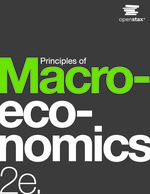
Notes
- Summary:
- Principles of Macroeconomics 2e covers the scope and sequence of most introductory economics courses. The text includes many current examples, which are handled in a politically equitable way. The outcome is a balanced approach to the theory and application of economics concepts. The second edition has been thoroughly revised to increase clarity, update data and current event impacts, and incorporate the feedback from many reviewers and adopters. - OpenStax ( ,,,, )
- Scope and Content:
- Preface
1 Welcome to Economics! 2 Choice in a World of Scarcity 3 Demand and Supply 4 Labor and Financial Markets 5 Elasticity 6 The Macroeconomic Perspective 7 Economic Growth 8 Unemployment 9 Inflation 10 The International Trade and Capital Flows 11 The Aggregate Demand/Aggregate Supply Model 12 The Keynesian Perspective 13 The Neoclassical Perspective 14 Money and Banking 15 Monetary Policy and Bank Regulation 16 Exchange Rates and International Capital Flows 17 Government Budgets and Fiscal Policy 18 The Impacts of Government Borrowing 19 Macroeconomic Policy Around the World 20 International Trade 21 Globalization and Protectionism A | The Use of Mathematics in Principles of Economics
B | The Expenditure-Output Model
Answer Key References
Index
- Citation/Reference:
- Greenlaw, S. A., & Shapiro, D. (2022). Principles of macroeconomics (2nd ed). OpenStax. https://openstax.org/details/books/principles-macroeconomics-2e
Record Information
- Source Institution:
- Rice University
- Holding Location:
- OpenStax
- Rights Management:
 This item is licensed with the Creative Commons Attribution License. This license lets others distribute, remix, tweak, and build upon this work, even commercially, as long as they credit the author for the original creation. This item is licensed with the Creative Commons Attribution License. This license lets others distribute, remix, tweak, and build upon this work, even commercially, as long as they credit the author for the original creation.
|